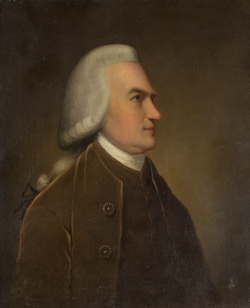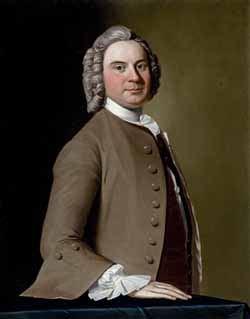“Willard Gibbs free”?
This entry is dated 30 Sept 1773, and it reads:
Willard Gibbs freeI doublechecked those words with the original pages and the cipher, and they’re accurate. (The transcriber did regularize Newell’s spelling, capitalization, and punctuation, deeming him “illiterate.”)
Figuring out what that meant was hampered by the visibility of Josiah Willard Gibbs, the great engineer at Yale, and his father, a Yale professor of theology. But several other members of the extended family also had that name.
Pushing back far enough, we find the first Josiah Willard Gibbs (1752–1822), not a direct ancestor of those two famous men but an uncle.
The Gibbs Family Papers are at the Clements Library, and its finding aid has a lot to say about that man’s father, Henry Gibbs (1709–1759, shown above courtesy of Geni).
Son of a minister, Henry went to Harvard College and “came into a considerable inheritance from both sides of the family.” He was the college librarian from 1730 to 1734, then settled in Salem as a merchant. His first wife died young, and he then married Katharine Willard (1724–1769), daughter of the province secretary, Josiah Willard.
This marriage further cemented the prominent place of the Gibbs in Salem society but brought comparatively little lucre, and only the fortunate bequest of £500 from a friend, William Lynde, helped the Gibbs maintain their lifestyle and social obligations. A theological liberal and political supporter of the power of the crown and broad colonial obligations, Gibbs held several important local and provincial offices during the next several years, including justice of the peace (appt. 1753), judge, delegate in the House of Representatives (three terms, beginning in 1753), and Clerk of the House (1755-1759). In February, 1759, at what should have been the peak of his career, he contracted measles, leaving five children and an insolvent estate with a meager 10s allotted to each child.Evidently Katherine Gibbs moved her family back to Boston, where she died on 31 May 1769. At that point her son Josiah Willard Gibbs was sixteen, not yet of legal age. He had a prestigious name and probably little else.
On 14 July, merchant and selectman Timothy Newell became Josiah’s guardian. (The probate judge overseeing this arrangement was Thomas Hutchinson. Newell’s sureties were Richard Clarke and John Amory. The witness to this action was William Cooper. Just showing what a tight little community colonial Boston was.)
It looks like Josiah Willard Gibbs became part of Timothy Newell’s household, probably learning business alongside that merchant’s nephew Thomas (who was three years older). Young Gibbs turned twenty-one on 30 Sept 1773—the day of Thomas Newell’s mysterious line.
Thus, “Willard Gibbs free” meant that Josiah Willard Gibbs had come of age. He could manage his own property and no longer answered to Timothy Newell. As to whether that was cause for celebration or mere acknowledgement, the diary didn’t say.
According to the Memoir of the Gibbs Family of Warwickshire, England, and United States of America (1879), compiled by (naturally) Josiah Willard Gibbs, this Willard Gibbs went on to marry Elizabeth Warner in 1779; she was just about to turn sixteen.
These Gibbses had ten or eleven children between 1780 and 1801. Their son George was born in Trenton, New Jersey, in 1793, and the family settled in Philadelphia. Josiah died in that city in 1822, Elizabeth in 1842. Their son Josiah Willard Gibbs was a merchant there. His son Josiah Willard Gibbs went out to Sacramento in the Gold Rush and died in 1850.














